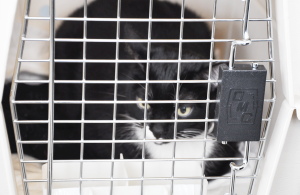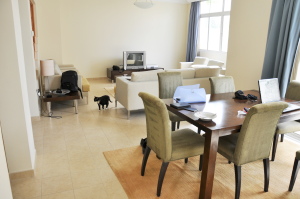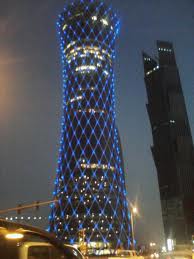Less than a week ago I moved for work to Doha, Qatar. I was rather worried, I have to say. The reaction from my colleagues was mostly negative: affectionate, but negative. The reaction from my friends was mixed: some found it excellent, other congratulate me, others said they'll miss us (and me to them!)
My first impression of Doha, is that I do not have a first impression ;-) So far I've only picked small clues about how things will be. Probably many of them are wrong. I write them here to laugh about them later.
The first things is that it is ridiculously hot, 40 Celsius during most of the day, and everybody says this is just a small preview of what is about to come in the next months, where it will go to 50 Celsius and "you won't be able to stand in the sun for 5 minutes".
 The cats hated to travel. They spent 12 hours in the cages, with 6 of them flying. When they were "delivered" to me, I found them alone next to the luggage belt. The good thing: they still had water in their dishes, meaning they were not moved so much. The cats were weird after the trip, they did not want to eat and were searching for Fabiola, but now they are easier, eating and wanting to go to the backyard. That, I will let them do it later on when they are more used to this place. For now, Panterita and Trufa are a big chunk of my social life.
The cats hated to travel. They spent 12 hours in the cages, with 6 of them flying. When they were "delivered" to me, I found them alone next to the luggage belt. The good thing: they still had water in their dishes, meaning they were not moved so much. The cats were weird after the trip, they did not want to eat and were searching for Fabiola, but now they are easier, eating and wanting to go to the backyard. That, I will let them do it later on when they are more used to this place. For now, Panterita and Trufa are a big chunk of my social life.
 I was assigned a house in a gated community where there are mostly people related to education/universities, many families with kids. The community has its own pool and gym. The house looks huge compared with what I've experienced in the last years: Rome (a studio of 16 sq m) and Barcelona (flats of 48 and 64 sq m).
I was assigned a house in a gated community where there are mostly people related to education/universities, many families with kids. The community has its own pool and gym. The house looks huge compared with what I've experienced in the last years: Rome (a studio of 16 sq m) and Barcelona (flats of 48 and 64 sq m).
* * *
The other part of my social life are conversations with taxi drivers. Kind of groundhog day: soccer, where is Chile, where is Sri Lanka or Ethiopia, how hot it is in summer, etc. Language is a big barrier. At work everybody speaks English, many of them better than I. Outside work people speak little English or the minimum for basic stuff.
And my activity so far has been ... shopping ;-) To get the home ready, to buy food, a cellphone, etc. There is a mini-mall with a medium-size supermarket attached to the community and I've also gone to the City Center which is the largest shopping mall. Prices are similar to the convenience stores in Barcelona. Here is a sample with approximate prices:
- 500g of pasta = 1 eur.
- Colgate toothpaste = 1 eur.
- Two liters of watermelon juice = 2 eur.
- Shampoo HnS = 3 eur.
- Small box of champignon = 1.5 eur
- One cucumber = 2 eur.
- Box of tea bags = 1.5 eur.
- One lettuce = 0.5 eur.
- Taxi from home to airport, 30 min = 10 eur.
- Taxi from home to city center, 20 min = 8 eur.
The bills are quite decorated, and as I mix lila and blue I tend to confuse the bills of 100 qar (20 eur) and 1 qar (0.2 eur).
* * *
 Most local women wear the Abaya (it covers the head and the body, but not the face) and about half wears a Niqab (a veil that allows you to see only the eyes). I have not seen any woman in Burqa (the one with the net in front of the eyes). Non-qatari women wear whatever they like: jeans, skirts (below the knee), t-shirts, etc. The only thing I saw was at the entrance of the Islamic Museum a friend of mine was asked to cover her shoulders.
Most local women wear the Abaya (it covers the head and the body, but not the face) and about half wears a Niqab (a veil that allows you to see only the eyes). I have not seen any woman in Burqa (the one with the net in front of the eyes). Non-qatari women wear whatever they like: jeans, skirts (below the knee), t-shirts, etc. The only thing I saw was at the entrance of the Islamic Museum a friend of mine was asked to cover her shoulders.
On that count, I have not experienced a "cultural shock". I hope to postpone that as much as possible. Well, I was about to experience it: in the toilet at the shopping mall there was a place that looked like an urinal but it was to wash your feet before praying ... fortunately I was suspicious and did not use it for what I thought it was used ;-)
Besides, in many aspects it is a developing country and in that sense, to a first-class human (I am second class), Qatar may look more strange. For instance: my experience to pass some accompanied cargo through customs was strange: there are written rules, unwritten rules, people asking you for money around, it is not clear immediately what for, and in general something systematically dysfunctional. But it can be understood. The logic is that you elbow your way to the counter and shove your papers in front of an officer, smile, and wait. Finally you have to pay to the guys that asked you for money initially because they are legally part of this business, kind of para-officers of this place.
The good side: rules are flexible. For instance the shuttle bus in the airport stops anywhere.
* * *
 In the city center there are very pretty buildings. I work at the Tornado Tower which is a twisted tower. Looking at all the funky buildings I thought they could have built a Sagrada Familia, just replacing animals and people by text and abstract motives.
In the city center there are very pretty buildings. I work at the Tornado Tower which is a twisted tower. Looking at all the funky buildings I thought they could have built a Sagrada Familia, just replacing animals and people by text and abstract motives.
From my office (now that I have an office) you can see buildings, cranes, and a piece of the bay. The work looks interesting, I am just starting to decide what exactly I am going to do, but there is a lot of energy, students, engineers, etc. I still don't have a good sense of what to expect of those around me. I don't care if it is much or little, fast or slow. I just want to understand the work rhythm and who are the reliable people.
* * *
What else can I say? I miss Fabiola so much. I have no idea how these two months without her are going to be. And for someone risk-averse as me, this situation is frightening at times. But I also have a lot of curiosity. I expect to satisfy that curiosity in the next months ;-)
Hugs for everyone. I don't tell you "everybody come to Doha!" because it will be a while before I am certain that it is a good idea ;-)